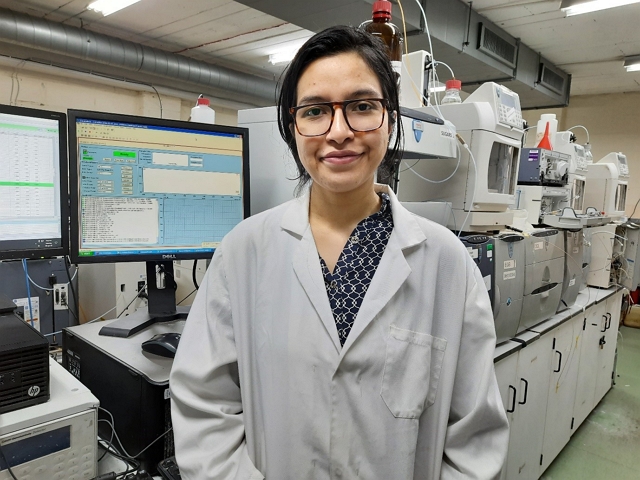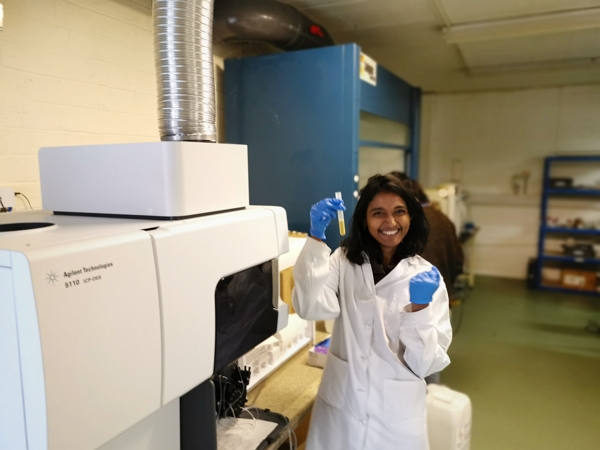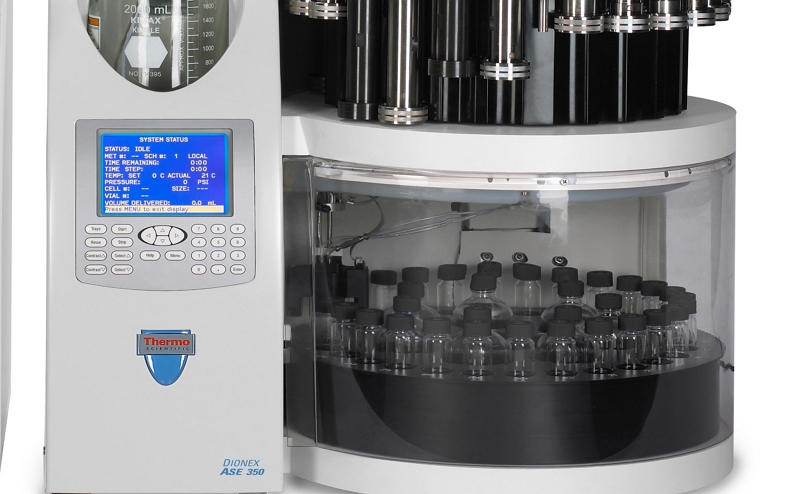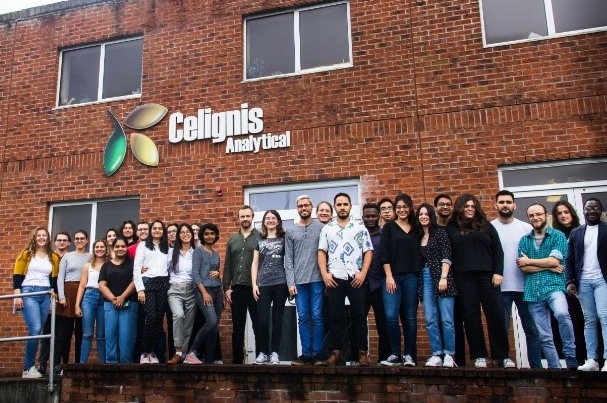Analysis of Anthocyanins
Background
Anthocyanins are a type of flavonoid,
a class of compounds with antioxidant effects, found in high quantities in various fruits and vegetables.
They are water-soluble pigments that may appear red, purple, or blue depending on the pH.
They belong to a parent class of molecules called flavonoids synthesized via the phenylpropanoid pathway. These pigments are found in the cell vacuole, mainly in flowers and fruits, but also in leaves, stems, and roots.
The primary role of anthocyanins in plants is attracting pollinators and seed dispersers. However, they also contribute to a plant's defenses against various stresses such as cold, drought, and disease.
They belong to a parent class of molecules called flavonoids synthesized via the phenylpropanoid pathway. These pigments are found in the cell vacuole, mainly in flowers and fruits, but also in leaves, stems, and roots.
The primary role of anthocyanins in plants is attracting pollinators and seed dispersers. However, they also contribute to a plant's defenses against various stresses such as cold, drought, and disease.
For humans, anthocyanins are notable for their potential health benefits. They are potent antioxidants,
protecting the body's cells from damage by free radicals. Some research suggests that they may offer anti-inflammatory,
anti-viral, and anti-cancer benefits. They may also aid in the prevention of cardiovascular disease and improve visual
and cognitive functions.
Anthocyanins are part of the reason fruits and vegetables with deep red, purple, and blue colours are often associated with health-promoting properties.
Anthocyanins are part of the reason fruits and vegetables with deep red, purple, and blue colours are often associated with health-promoting properties.
Anthocyanins in Different Types of Biomass
Examples of some flowers containing anthocyanins are listed below:
Get more info...Flowers
- Roses - Many varieties of roses contain anthocyanins, giving them colours ranging from pink to deep red and purple..
- Pansies - These flowers exhibit a wide variety of colours due to anthocyanins, including many shades of purple and blue.
- Petunias - The purple and blue hues of many petunias are a result of anthocyanins.
- Hydrangeas - In some varieties of hydrangeas, the colour of the flowers can be changed by adjusting the pH level of the soil, which in turn affects the colour of the anthocyanins.
- Tulips - Some tulips have deep purple, pink, or red hues due to the presence of anthocyanins.
- Delphiniums - The stunning blue colour of delphiniums is due to anthocyanins.
Get more info...Flowers
Examples of some fruits and vegetables containing anthocyanins are listed below:
Get more info...Fruit & Veg
- Berries - Berries, including blueberries, raspberries, blackberries, and cranberries, are some of the richest sources of anthocyanins.
- Cherries - Both sweet and tart cherries contain anthocyanins, with tart cherries having particularly high levels.
- Red and Purple Grapes - The skin of red and purple grapes is a good source of anthocyanins.
- Red Onions - The outer layers of red onions contain significant amounts of anthocyanins.
- Eggplant - The purple skin of eggplants is rich in anthocyanins, specifically one called nasunin.
- Blackcurrants - These small berries are extremely rich in anthocyanins.
- Black Rice - Sometimes referred to as "forbidden rice", black rice has a deep black or purple color due to its anthocyanin content.
- Purple, Red, and Blue Potatoes - These varieties of potatoes contain more anthocyanins than their white or yellow counterparts.
- Purple Corn - This variety of corn is rich in anthocyanins, giving it a deep purple color.
Get more info...Fruit & Veg
Examples of some seeds containing anthocyanins are listed below:
Get more info...Seeds
- Chia Seeds - Black chia seeds contain a certain amount of anthocyanins, primarily cyanidin and delphinidin derivatives, which contribute to their dark coluor.
- Black Soybean - Black soybean seeds have anthocyanins in their seed coat, primarily cyanidin-3-glucoside, delphinidin-3-glucoside, and peonidin-3-glucoside.
- Grape Seeds (from dark grapes) - Grape seeds from dark-coloured grapes contain several anthocyanins, including malvidin, peonidin, and cyanidin.
- Black Sesame Seeds - Black sesame seeds have anthocyanins, specifically cyanidin-3-glucoside, that contribute to their black colour.
Get more info...Seeds
Extraction of Anthocyanins from Biomass
The extraction process, including the solvents and methods used, can influence the concentration and types of anthocyanins present in the final extract.
It is often the case that a balance needs to be found between fully-extracting all anthocyanins while also ensuring that the compounds that are
obtained are of a high quality and not degraded.
At Celignis we have extensive experience in the design and optimisation of extraction protocols for a wide variety of chemical constituents from many different biomass types. If needed we can also work on processes to separate and purify the target compounds.
Click here to read more about Celignis's Bioprocess Development Services for the extraction of chemicals from biomass.
Get more info...Biomass Extractions
At Celignis we have extensive experience in the design and optimisation of extraction protocols for a wide variety of chemical constituents from many different biomass types. If needed we can also work on processes to separate and purify the target compounds.
Click here to read more about Celignis's Bioprocess Development Services for the extraction of chemicals from biomass.
Get more info...Biomass Extractions
Analysis of Anthocyanins at Celignis
We have the necessary equipment and expertise to determine the amount and distribution of anthocyanins in
a wide variety of biomass samples.
Feel free to get in touch with us to request further information and a quotation.
Request a QuoteAnthocyanins Analysis
Feel free to get in touch with us to request further information and a quotation.
Request a QuoteAnthocyanins Analysis








